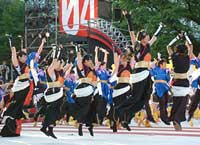|
|
|||||||
|
|
|||||||
|
|||||||
| | Web Japan >> | Trends in Japan >> | Arts & Entertainment >> | Local Festivals Go National | |
|
LOCAL FESTIVALS GO NATIONAL Hometown Nostalgia Sparks Boom in Traditional Events (December 13, 2004) Yosakoi, Awa-odori, and Eisa are words guaranteed to evoke happy memories among natives of Kochi, Tokushima, and Okinawa Prefectures, respectively, for they are the names of traditional festivals unique to those regions. Recently, however, these festivals rich in local color are being held not only in their regions of origin but in localities all across Japan. In Tokyo and other urban areas, in particular, which are home to many people from provincial regions, such festivals are attracting larger and larger crowds. They are also helping to revive hometown spirit and to bring neighbors closer together. Taking the Capital by Storm The Kanagawa Yamato Awa-odori Festival, which takes place in the city of Yamato in Kanagawa Prefecture, was held for the twenty-eighth time this year, attracting some 450,000 participants. Sapporo's Yosakoi Soran Festival began in 1992 on the initiative of a student who had been deeply impressed by the Yosakoi Festival in Kochi Prefecture. It has since developed into a huge event that is famous across the land. New Festivals Springing Up Next autumn Tokyo's Arakawa Ward will host the Arakawa Yosakoi Festival. Outside the metropolitan region, Wakayama City hosted the first Kishu Yosakoi Festival in July, which attracted participation from 1,500 people, including some from other prefectures. Other festivals that have been held outside their places of origin include Gujo-odori, a form of dancing from Gujo-hachiman in Gifu Prefecture, which took place in Aoyama, Tokyo; a version of Osaka's Kawachi Ondo Dancing Festival that was held in Kinshicho, Tokyo; and a version of the Tanabata Edoro Festival of Yuzawa City, Akita Prefecture, that was held in the Tokyo district of Kanda. Bringing Communities Together In the birthplace of Yosakoi, Kochi City, the Yosakoi Koshien festival was held in September, with the aim of enabling middle and high school students nationwide to experience Yosakoi. Participants came from far and wide to join in. The circle of people around the country united by their passion for Yosakoi continues to grow. Copyright (c) 2004 Web Japan. Edited by Japan Echo Inc. based on domestic Japanese news sources. Articles presented here are offered for reference purposes and do not necessarily represent the policy or views of the Japanese Government. |
DANCING IN THE STREETS (August 13, 2003) MIDSUMMER NIGHTS' REVELRY (July 22, 2003) RITES OF SUMMER (June 27, 2003) HEAVENLY HOKKAIDO (June 2, 2003) |
|
|



